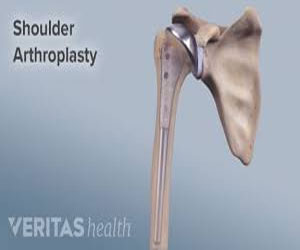- Home
- Editorial
- News
- Practice Guidelines
- Anesthesiology Guidelines
- Cancer Guidelines
- Cardiac Sciences Guidelines
- Critical Care Guidelines
- Dentistry Guidelines
- Dermatology Guidelines
- Diabetes and Endo Guidelines
- Diagnostics Guidelines
- ENT Guidelines
- Featured Practice Guidelines
- Gastroenterology Guidelines
- Geriatrics Guidelines
- Medicine Guidelines
- Nephrology Guidelines
- Neurosciences Guidelines
- Obs and Gynae Guidelines
- Ophthalmology Guidelines
- Orthopaedics Guidelines
- Paediatrics Guidelines
- Psychiatry Guidelines
- Pulmonology Guidelines
- Radiology Guidelines
- Surgery Guidelines
- Urology Guidelines
Risk of further revision surgery high in shoulder replacement: BMJ

Started as early as 1950, shoulder joint replacement is less common than knee or hip replacement, but it is just as successful in relieving joint pain. Over the years, shoulder joint replacement has come to be used for different forms of arthritis and considered to be safe.
According to a study published by The BMJ today, risks associated with shoulder replacement surgery for arthritic conditions are higher than previously estimated. The study finds a need for further surgery particularly high in younger men and serious complications surprisingly common in older people between the age group between 60 and over 85 years.
The number of shoulder replacements performed is expanding rapidly. In adults aged over 50, surgery increased more than 5.6-fold, from 1,018 cases in 1998 to 5,691 in 2016. Despite this growth, no study has reported on the lifetime risk of further surgery, and serious events are considered rare.
The findings show that one in four men aged 55-59 years is at risk of needing further revision surgery, especially during the first five years after surgery. What’s more, the risks of serious adverse events (such as heart attacks, major blood clots and chest infections) within 90 days of surgery are much higher than previously estimated, particularly in those over 85 years.
The researchers say these risks should be made clearer to patients before they opt for surgery, and they caution against “unchecked expansion” of shoulder replacement surgery in both younger and older patients.
So a team of researchers based at the University of Oxford used hospital and mortality records to calculate precise risk estimates of serious adverse events and lifetime risk of revision surgery, after non-emergency (elective) shoulder replacement surgery for arthritis.
The study included just over 58,000 procedures carried out in nearly 52,000 adults (aged 50 or over) across England between April 1998 and April 2017. Average age at surgery was 72 years and the average follow-up was 5.6 years.
Rates of serious adverse events were calculated at 30 and 90 days after surgery and included major blood clots, heart attack, infections, stroke and death. Revision risk according to age and sex was estimated at 3, 5, 10, and 15 years after surgery and over a patient’s lifetime.
The lifetime risk of revision surgery ranged from 1 in 37 in women aged 85 years and older to 1 in 4 in men aged 55-59 years. The risks of revision were highest during the first five years after surgery.
The risk of any serious adverse event at 30 days post-surgery was 1 in 28, and at 90 days post-surgery was 1 in 22.
Serious adverse events were associated with increasing age, existing illness (comorbidity), and male sex - 1 in 9 women and 1 in 5 men aged 85 years and older experienced at least one serious adverse event within 90 days.
This is an observational study, and as such, can’t establish cause, and the researchers cannot rule out the possibility that some unmeasured factors may have influenced the results. Nevertheless, they say these risks are higher than previously considered, and for some could outweigh any potential benefits.
They say younger patients, particularly men, need to be aware of a higher likelihood of early failure of shoulder replacement and the need for further and more complex revision replacement surgery. And they suggest that all patients should be counselled about the risks of serious adverse events.
As the population ages, it is likely that demand for shoulder replacement in older people will continue to increase, and the higher risk of adverse events described here should form part of shared decision making with patients, they conclude.
For more details click on the link: http://www.bmj.com/

Disclaimer: This site is primarily intended for healthcare professionals. Any content/information on this website does not replace the advice of medical and/or health professionals and should not be construed as medical/diagnostic advice/endorsement or prescription. Use of this site is subject to our terms of use, privacy policy, advertisement policy. © 2020 Minerva Medical Treatment Pvt Ltd